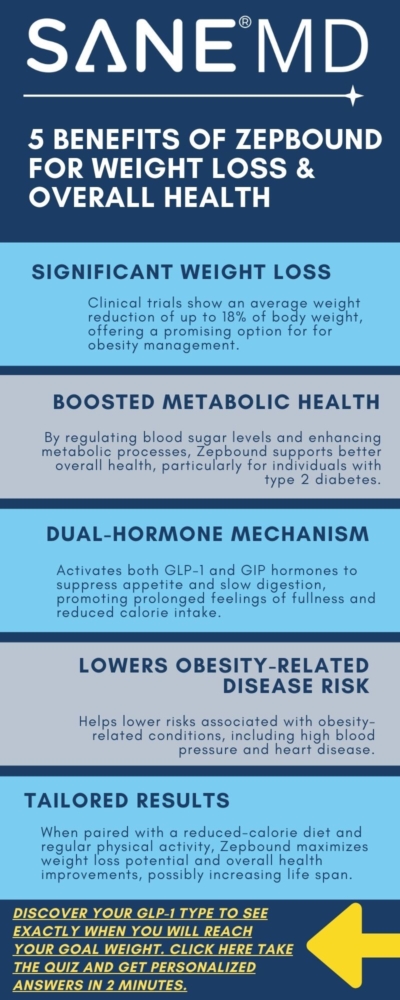Quiz: How Does Zepbound Stack Up for Your Weight Loss Needs?
Dr. Matthew Olesiak, MD, is the Chief Medical Director at SANESolution, a renowned wellness technology company dedicated to providing evidence-based solutions for optimal living. Dr. Olesiak earned his medical degree from the prestigious Jagiellonian University Medical College in Kraków, Poland, where he developed a strong foundation in medicine.
Zepbound is an injectable medication designed to assist adults with weight loss by using science in appetite and digestion regulation. For individuals struggling with obesity or excess weight and related health conditions, Zepbound offers a potential path to improved health outcomes.
How does Zepbound stack up for your weight loss needs? This article explores its benefits, risks, and mechanisms to help you make an informed decision. To further determine if Zepbound might be the right fit for your weight management goals, consider taking the weight loss drug type quiz, which provides tailored insights based on your unique needs.
Key Takeaways
Here are the most critical points about Zepbound:
- Zepbound works by activating GLP-1 and GIP hormones to regulate appetite and slow digestion, promoting fullness.
- Eligibility depends on factors like body mass index (BMI), age, and related health conditions, but certain individuals should avoid it due to potential risks.
- Consulting a healthcare provider is essential to weigh the benefits and risks of this treatment.
What is Zepbound and How Does it Work?
Zepbound is a prescription medication containing tirzepatide, the same active ingredient found in the type 2 diabetes medication Mounjaro. It operates as a dual-agonist, activating two key hormones, glucagon-like peptide-1 (GLP-1) and glucose-dependent insulinotropic polypeptide (GIP). These hormones belong to a group called incretins, which regulate appetite and digestion.
GLP-1 works in the brain to suppress appetite while slowing the stomach’s emptying process, leading to prolonged fullness. GIP further complements this by enhancing metabolic processes. This dual-action mechanism makes Zepbound a valuable tool in weight management.
Mechanism of Action
Zepbound works by mimicking the action of two natural hormones in the body: glucose-dependent insulinotropic polypeptide (GIP) and glucagon-like peptide-1 (GLP-1). These hormones are crucial in regulating appetite, blood sugar levels, and digestion.
When you take Zepbound, it activates these hormones to help control your hunger and slow down the digestive process. This means you feel fuller for longer, which can help you eat less and lose weight. Additionally, by regulating blood sugar levels, Zepbound can also assist in managing conditions like type 2 diabetes, making it a multifaceted tool in chronic weight management.
Benefits of Zepbound for Weight Loss
Zepbound has shown promising results in clinical trials, where participants experienced an average weight loss of 18% of their body weight. When considering how much weight individuals lost, the results varied based on factors such as diabetes status and medication dosage. This makes it a promising option for adults managing obesity or excess weight, particularly when combined with a reduced-calorie diet and regular physical activity.
Additional benefits include improvements in health conditions linked to obesity, such as high blood pressure and blood sugar levels. By helping users lose and maintain weight, Zepbound reduces risks associated with chronic illnesses.
For a tailored understanding of how Zepbound aligns with your weight loss goals, consider using the weight loss drug type quiz to evaluate its suitability.
Eligibility and Contraindications for Severe Gastrointestinal Disease
Zepbound is approved by the FDA for adults aged 18 and older who are obese or overweight with weight-related health issues, such as type 2 diabetes or hypertension. However, it is not suitable for everyone.
Individuals with a personal or family history of medullary thyroid carcinoma or multiple endocrine neoplasia syndrome type 2 (MEN 2) should refrain from using Zepbound. Additionally, those with severe gastrointestinal disease, severe gastrointestinal conditions, pancreatitis, or who are pregnant should not use this medication.
Discussing your medical history with a healthcare provider is crucial to determining eligibility and minimizing risks.
Side Effects and Safety
Like any medication, Zepbound carries potential side effects. Common ones include:
- Nausea
- Diarrhea
- Constipation
- Tiredness
- Injection site reactions
Serious allergic reactions are a critical adverse effect requiring immediate medical attention.
Severe side effects, though rare, may include pancreatitis, thyroid cancer, and gallbladder problems. Contact a healthcare provider immediately if these occur.
To reduce the likelihood of mild side effects, avoid high-fat meals and monitor your body’s reactions during treatment. If you are still unsure about balancing risks and benefits, the weight loss drug type quiz may help guide your decision.
Managing Side Effects
To minimize side effects, pay attention to portion sizes and avoid high-fat foods that may worsen gastrointestinal symptoms. If you encounter severe side effects, such as extreme abdominal pain or ongoing vomiting, reach out to your healthcare provider without delay.
Managing side effects effectively requires a complete weight loss plan that integrates Zepbound with dietary and lifestyle changes.
Cost and Accessibility
Zepbound is priced at over $1,000 per month. However, single-dose vials are available at a discounted rate, offering a more affordable option for self-pay patients. This accessibility expands Zepbound’s reach amid high demand.
When considering Zepbound, evaluate your budget and potential insurance coverage. Compared to similar GLP-1 medications, Zepbound’s pricing and dosage options offer competitive benefits.
How Zepbound Compares to Other Weight Loss Medications
Zepbound is often compared to Mounjaro, Wegovy, and Ozempic. While Zepbound and Mounjaro share the same active ingredient, Zepbound is specifically approved for weight loss, whereas Mounjaro is marketed to treat diabetes.
Dual-agonist drugs like Zepbound and Mounjaro activate both GLP-1 and GIP hormones, offering a broader metabolic impact than single-agonist drugs like Wegovy and Ozempic. To explore how these options align with your needs, consider taking the weight loss drug type quiz here.
Dosage and Administration
Zepbound is administered once weekly as a subcutaneous injection.
Here is the recommended dosing schedule:
- Initial dose: 2.5 mg once weekly for the first four weeks.
- Maintenance dose: 5 mg weekly, adjusted by the healthcare provider as needed.
Proper administration techniques and following your healthcare provider’s instructions are vital to ensure safety and effectiveness.
Interactions and Ingredients
Certain medications, supplements, and foods may interact with Zepbound. For instance, birth control pills may become less effective during treatment.
- Active ingredient: Tirzepatide
- Inactive ingredients: Sodium chloride, sodium phosphate dibasic heptahydrate, and water for injection
Always disclose all current medications and supplements to your healthcare provider before starting Zepbound.
Pregnancy and Breastfeeding
There is limited information on Zepbound’s safety during pregnancy and breastfeeding. It is unknown whether the drug passes into breast milk or harms an unborn baby.
Pregnant or breastfeeding individuals should consult their healthcare provider to discuss alternative options.
Lifestyle and Dietary Recommendations
To maximize the benefits of Zepbound, it’s essential to incorporate lifestyle and dietary changes into your routine. Here are some recommendations:
- Reduced-Calorie Diet: Pairing Zepbound with a reduced-calorie diet can significantly enhance weight loss results. Focus on nutrient-dense foods like vegetables, lean proteins, and legumes while avoiding high-fat and high-sugar foods.
- Regular Physical Activity: Incorporate at least 150 minutes of moderate-intensity exercise per week. Activities like walking, swimming, or cycling can help you burn calories and improve overall health.
- Portion Control: Portion Control: Be mindful of portion sizes to prevent overeating. Using smaller plates and measuring servings can help you manage calorie intake effectively.
- Hydration: Drink plenty of water throughout the day. Staying hydrated can help control hunger and support digestion.
- Monitor Side Effects: Be mindful of how your body reacts to Zepbound. Avoid high-fat meals that may exacerbate gastrointestinal symptoms. If you experience severe side effects, consult your healthcare provider immediately.
By integrating these lifestyle and dietary changes, you can enhance the effectiveness of Zepbound and work towards achieving your weight loss goals more efficiently.
Long-Term Use and Chronic Weight Management
Zepbound is intended for long-term use as part of a weight loss plan. However, regular check-ins with a healthcare provider are essential to monitor progress and adjust dosages.
To maximize results, pair Zepbound with a balanced diet and consistent exercise routine. Achieving lasting weight loss requires a multifaceted approach.
FAQs About Zepbound
Below are answers to frequently asked questions about Zepbound, aimed at providing clarity for those considering this medication.
1. What makes Zepbound different from other weight loss drugs?
Zepbound utilizes a dual-agonist mechanism, activating both GLP-1 and GIP hormones.
This dual approach differentiates it from single-agonist drugs like Wegovy and Ozempic, potentially offering broader metabolic benefits for weight loss.
2. Who is eligible to use Zepbound?
Zepbound is approved for adults aged 18 and older who are obese or overweight with weight-related medical problems.
However, individuals with a history of thyroid cancer, pancreatitis, or gastrointestinal diseases should avoid it.
3. What are the most common side effects of Zepbound?
Common side effects include nausea, diarrhea, and constipation.
Severe side effects, such as pancreatitis or thyroid cancer, are rare but require immediate medical attention.
4. How much does Zepbound cost?
Zepbound typically costs over $1,000 per month. Discounted single-dose vials are available, making it more affordable for some patients.
Discuss cost-saving options with your healthcare provider.
5. How can I determine if Zepbound is the right choice for me?
Consulting a healthcare provider is the best way to determine eligibility.
Also, the weight loss drug type quiz can provide personalized insights to help guide your decision.
Conclusion
Zepbound offers a scientifically-backed option for weight loss, particularly for individuals managing obesity or weight-related health conditions. While it has shown promising results, it is essential to weigh the benefits and risks carefully.
Consulting with a healthcare provider and using tools like the weight loss drug type quiz can help determine if Zepbound is the right choice for your journey toward improved health.





